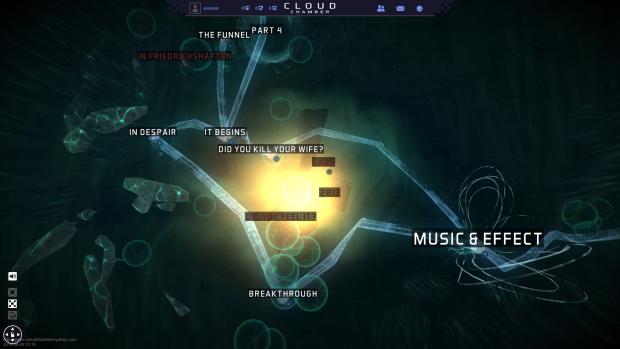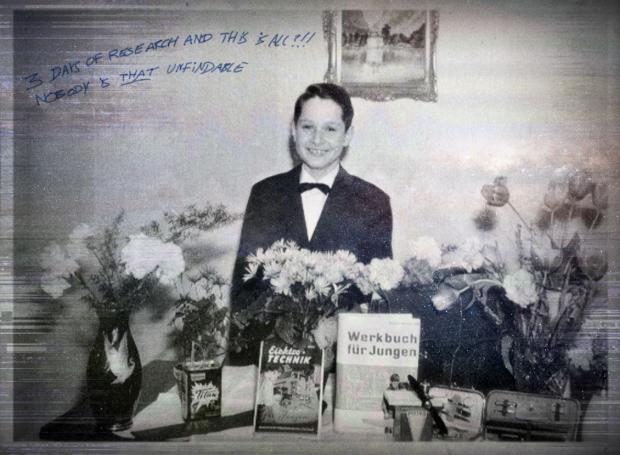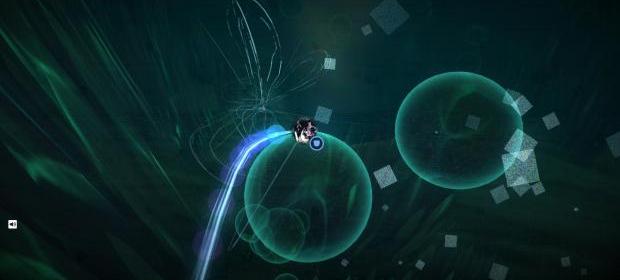Cloud Chamber is an MMO from Investigate North that puts players in the role of an investigator, of sorts, asking them to actively discuss and compare thoughts about all manner of materials, such as found footage style vignettes and photographs, which are ‘found’ within the Cloudscape, a digital database that is the vehicle for the narrative of Cloud Chamber.
In part one of our chat with Cloud Chamber’s Director, Christian Fonnesbech, we discovered the origins of Cloud Chamber’s creation, its idea, and the spark that defines how the game works. In part two Christian sheds more light on the narrative themes, the reasons behind them, and the artistic intent behind the game. Part three saw Christian tackle the difficulties of making a game with people that don’t usually make games and now finally, in part four, we tidy up those loose ends – playing the game, the weight of expectation, music, and Ketchup.
 So how much time would you say the average player could spend in Cloud Chamber season 1?
So how much time would you say the average player could spend in Cloud Chamber season 1?
What we saw was that people who really get into the discussion in the beta spent about 25 hours in the game. We’ve added a new thing now which is a social feed, so in the Steam version you’re able to keep track of all your discussions very very easily, which means you won’t have to travel around to keep discussing. You had to do that in the beta so people just wouldn’t, it took too long. So in the Steam one whenever anyone does anything on one of your posts you can just answer it. So I honestly think playtime is going to be closer to 50 to 75 hours, if you’re really into it.
But you can just blast through it and just watch the good stuff in, like, seven hours. Maybe five. So you don’t have to spend forever in there but if you get heavily involved in discussing stuff then you can get heavily involved. That to me is ideal – your playstyle can decide how long you spend in there.
If you don’t want to write anything at all – if you just want to watch the cool stuff, and maybe look at what the others are discussing, you can get through it in about five to ten hours. But then certain files are locked, and unless you get involved in the discussions you’re never going to get to see them.
Can you freely move around and watch whatever you want to?
Yeah, so, you’re going to have to progress, but they’re not locked. So, 80% of the files you can progress through with no effort aside from navigation. You still have to ‘progress’ by looking at the files but you don’t have to contribute. It doesn’t make any demand on you. But to get to those 20% of locked files you have to engage, you have to contribute to the investigation and get likes, basically. You have to get upvotes, and that’s going to be interesting.
But I do think that in this Facebook/Reddit/Steam Community age, people know what it is to post, they know what it is to comment, and the demands on getting likes aren’t that high. If you’re really determined to see a file it isn’t going to be that hard to go out and get a link and be like ‘could it be this?’ You then get a single like and boom. And if you’re not willing to do that, then perhaps you’re not interested anyway.

Do you ever get scared that players won’t take to the game?
We had this great experience where the first time we tested it we took Cloud Chamber to a high school, and I think we were 18 months in, so more than 18 months ago, and we’d never tested it aside from a few paper prototype tests, so this was a functioning prototype with film clips and everything. I sat behind the quiet girl in the class – there were about seven of us and about twenty students – and it just worked for her. You could tell that she went into it and it felt natural to her, which was just, well, I think I cried a bit! Haha. A lot of tension was released right there. I mean, it’s not as if we had this conversation with the film institute and they handed us a big bag of money and they left us alone, it doesn’t work like that, it’s ‘we’re going to give you a little bit of money so you can write a synopsis, and if we like it we might give you some more money, and then you come back and they say ‘right, so, now we’ll give you enough to make a rudimentary version and, if we like it, we may give you some more!’
And then you come back with that and they say ‘right, Christian, we know you’re used to producing your own stuff, but that’s not how we work here. You can’t be both creatively responsible and financially responsible, so if you find a producer we like, we may give you more money. And so it continues for two years, with you never knowing if you’re gonna get past the next gate. So you can imagine when, after two years, you test it and the player doesn’t run away, that’s quite a relief! I don’t know how the big film makers do it when they’ve got, like, 60 million dollars. But then they are working in a proven format, so I guess that makes it a bit easier…

Finally I just have to say, Cloud Chamber has an intoxicating soundtrack. You’ve spoken a lot about the narrative and gameplay designs, but how much effort went into the construction of its audio?
I spent so long on the music. I’m hard of hearing, so for some reason sound is extremely important to me. One of the big puzzles with Cloud Chamber was ‘how do we get mood music into found footage?’ Because, y’know, the nature of found footage is that there is no music, because it’s real. We’re pretending that the characters have filmed it themselves, you can’t suddenly add an orchestra. Unless, that is, you start building the music into the story, so that’s what we did.
And then at the same time, while I was researching all this astrophysics I was also researching avant garde music, trying to find a sound for Cloud Chamber, and something just suddenly clicked that the technologies that allowed us to look into space were also the technologies that made us able to make electronic music. So, when that happened, I started looking for ‘where do the textures of electronic music fit with the textures of astrophysics?’ And it actually fits extremely well.
If you look at space photography from the Hubble telescope for example, and you then put on this classic electronic music then it fits perfectly. They’re the same thing, born of the same time and the same technologies and the same kind of emotions. And it’s not an accident that the likes of Mike Sheridan often get associated with space imagery.
Then we had this whole idea of Kathleen as this melancholy figure, this mysterious character, who’s grown up in an emotionless, scientific family, so she’s got all of this emotion bubbling away underneath, so if you take that then you start discovering the tracks we’ve got in there. I just got to the point where I knew the kind of sound and I was just looking for the exact emotions that would work.
Y’know, it was not a job that was un-pleasurable. I think I spent a year with my headphones on looking for stuff, that was great. I mean, I’m starting the next project now, it’s at the concept stage, and the first thing is ‘how the hell does this sound?’

Thank you! This has been incredibly insightful but one mystery remains unanswered – where do you keep your ketchup?
Hah! It’s in the fridge! Well actually, it sometimes skips in and out. Sometimes it’s out, but it’s mainly in the fridge. Recently it’s been in the fridge. There was a long period where it was actually on the windowsill, and then we kind of agreed that that was probably a bad idea because we have kids, so getting the ketchup locked up is probably a good idea.
God is a Geek would like to thank Christian for his time. Cloud Chamber is available now on Steam, and if you’ve got a minute you can read our full review of Investigate North’s ambitious online multiplayer narrative experiment by clicking here.






